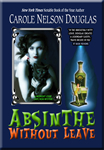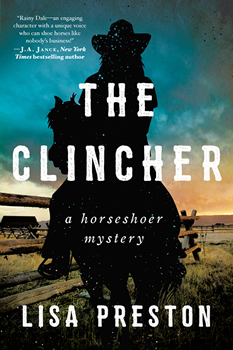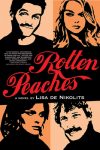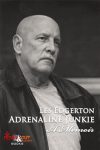

December 3 – 9: “Who is your favorite fictional mentor?”
 Mentors can be some of the most intriguing characters in fiction as they are often deeply layered and, at times, seem counterintuitive. This week we’re joined by ITW Members Lisa de Nikolits, Lisa Preston, Carole Nelson Douglas, Frank Zafiro, Lynn Cahoon and Les Edgerton as they discuss their favorite fictional mentors: Who is your favorite fictional mentor? What is foremost in your mind as you create your mentor characters? Scroll down to the “comments” section to follow along!
Mentors can be some of the most intriguing characters in fiction as they are often deeply layered and, at times, seem counterintuitive. This week we’re joined by ITW Members Lisa de Nikolits, Lisa Preston, Carole Nelson Douglas, Frank Zafiro, Lynn Cahoon and Les Edgerton as they discuss their favorite fictional mentors: Who is your favorite fictional mentor? What is foremost in your mind as you create your mentor characters? Scroll down to the “comments” section to follow along!
 Carole Nelson Douglas’s 65 novels include national bestsellers in mystery, high fantasy and Noir urban fantasy. She was the first woman to spin-off a Sherlockian series and first author to make a Canon woman a protagonist, Irene Adler. Good Night, Mr. Holmes is a New York Times Notable Book of the Year. Her hard-boiled Midnight Louie feline PI character (a bow to Sam Spade etc.) starts his third series with Absinthe Without Leave and 33 books in print. Douglas short stories appear in many anthologies and several “Best of Year” collections, and she’s won many writing awards.
Carole Nelson Douglas’s 65 novels include national bestsellers in mystery, high fantasy and Noir urban fantasy. She was the first woman to spin-off a Sherlockian series and first author to make a Canon woman a protagonist, Irene Adler. Good Night, Mr. Holmes is a New York Times Notable Book of the Year. Her hard-boiled Midnight Louie feline PI character (a bow to Sam Spade etc.) starts his third series with Absinthe Without Leave and 33 books in print. Douglas short stories appear in many anthologies and several “Best of Year” collections, and she’s won many writing awards.
 Frank Zafiro was a police officer in Spokane, Washington, from 1993 to 2013. He retired as a captain. He is the author of numerous crime novels, including the River City novels and the Stefan Kopriva series. He lives in Redmond, Oregon, with his wife Kristi, dogs Richie and Wiley, and a very self-assured cat named Pasta. He is an avid hockey fan and a tortured guitarist.
Frank Zafiro was a police officer in Spokane, Washington, from 1993 to 2013. He retired as a captain. He is the author of numerous crime novels, including the River City novels and the Stefan Kopriva series. He lives in Redmond, Oregon, with his wife Kristi, dogs Richie and Wiley, and a very self-assured cat named Pasta. He is an avid hockey fan and a tortured guitarist.
 Lisa Preston turned to writing after careers as an Alaskan police sergeant and a fire department paramedic. Booklist praised her debut psychological thriller, Orchids and Stone (Thomas & Mercer, 2016), as riveting. Publisher’s Weekly called her psychological suspense, The Measure of the Moon (Thomas & Mercer, 2017), gripping. She runs and rides on the Olympic Peninsula, west of Seattle.
Lisa Preston turned to writing after careers as an Alaskan police sergeant and a fire department paramedic. Booklist praised her debut psychological thriller, Orchids and Stone (Thomas & Mercer, 2016), as riveting. Publisher’s Weekly called her psychological suspense, The Measure of the Moon (Thomas & Mercer, 2017), gripping. She runs and rides on the Olympic Peninsula, west of Seattle.
 Originally from South Africa, Lisa de Nikolits has lived in Canada since 2000. She has a Bachelor of Arts in English Literature and Philosophy and has lived in the U.S.A., Australia and Britain. No Fury Like That, her most recently published work, is her seventh novel. It will be published in Italian, under the title Una furia dell’altro mondo, in 2019. Previous works include: The Hungry Mirror (winner 2011 IPPY Gold Medal); West of Wawa (winner 2012 IPPY Silver Medal); A Glittering Chaos (winner 2016 Bronze IPPY Medal); The Witchdoctor’s Bones; Between The Cracks She Fell (winner 2016 for Contemporary Fiction); and The Nearly Girl. Lisa lives and writes in Toronto. Her ninth novel, The Occult Persuasion and the Anarchist’s Solution is forthcoming in 2019.
Originally from South Africa, Lisa de Nikolits has lived in Canada since 2000. She has a Bachelor of Arts in English Literature and Philosophy and has lived in the U.S.A., Australia and Britain. No Fury Like That, her most recently published work, is her seventh novel. It will be published in Italian, under the title Una furia dell’altro mondo, in 2019. Previous works include: The Hungry Mirror (winner 2011 IPPY Gold Medal); West of Wawa (winner 2012 IPPY Silver Medal); A Glittering Chaos (winner 2016 Bronze IPPY Medal); The Witchdoctor’s Bones; Between The Cracks She Fell (winner 2016 for Contemporary Fiction); and The Nearly Girl. Lisa lives and writes in Toronto. Her ninth novel, The Occult Persuasion and the Anarchist’s Solution is forthcoming in 2019.
 Lynn Cahoon is the author of the New York Times and USA Today best-selling Tourist Trap cozy mystery series. GUIDEBOOK TO MURDER, book 1 of the series, won the Reader’s Crown for Mystery Fiction. She also pens the Cat Latimer series available in mass market paperback with SLAY IN CHARACTER coming in late 2018. In addition to releasing WHO MOVED MY GOAT CHEESE in March as part of the new Farm to Fork series, KILLER GREEN TOMATOES released July 3rd, 2018.
Lynn Cahoon is the author of the New York Times and USA Today best-selling Tourist Trap cozy mystery series. GUIDEBOOK TO MURDER, book 1 of the series, won the Reader’s Crown for Mystery Fiction. She also pens the Cat Latimer series available in mass market paperback with SLAY IN CHARACTER coming in late 2018. In addition to releasing WHO MOVED MY GOAT CHEESE in March as part of the new Farm to Fork series, KILLER GREEN TOMATOES released July 3rd, 2018.
 Les Edgerton is a full-time writer. He is an ex-con, having served two years at Pendleton Reformatory on a 2-5 sentence for second-degree burglary back in the late sixties. His work has been nominated for or been awarded: the Pushcart Prize, O. Henry Award, PEN/Faulkner Award, Derringer Award, Spinetingler Magazine Thriller of the Year, Jesse Jones Book Award, Edgar Allan Poe Award (short story category), Violet Crown Book Award, and others.
Les Edgerton is a full-time writer. He is an ex-con, having served two years at Pendleton Reformatory on a 2-5 sentence for second-degree burglary back in the late sixties. His work has been nominated for or been awarded: the Pushcart Prize, O. Henry Award, PEN/Faulkner Award, Derringer Award, Spinetingler Magazine Thriller of the Year, Jesse Jones Book Award, Edgar Allan Poe Award (short story category), Violet Crown Book Award, and others.
- LAST GIRL MISSING with K.L. Murphy - July 25, 2024
- CHILD OF DUST with Yigal Zur - July 25, 2024
- THE RAVENWOOD CONSPIRACY with Michael Siverling - July 19, 2024
